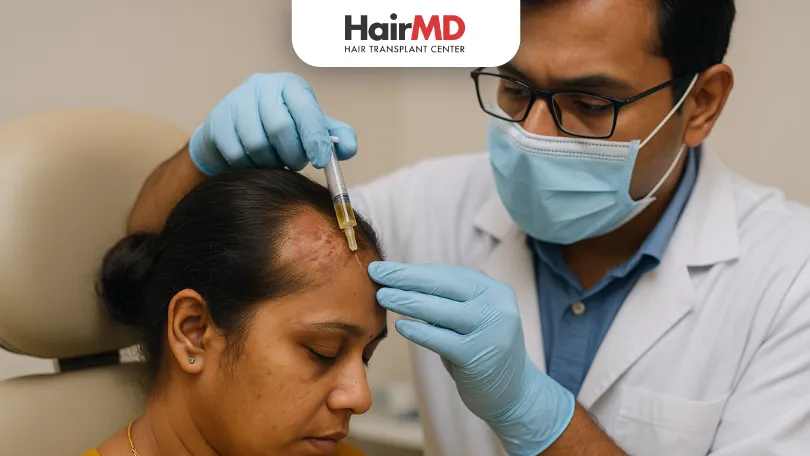27th July, 2025

Scarring alopecia causes permanent hair loss, but early treatment can help preserve existing hair. Understand causes, treatment options, and when to seek expert help.
Scarring alopecia, or cicatricial alopecia, is a permanent form of hair loss caused by inflammation that destroys hair follicles. It often results in bald patches with symptoms like redness, scaling, itching, or burning on the scalp. While the damage is irreversible, early treatment can help stop progression, reduce inflammation, and preserve existing hair.
Common treatments include corticosteroids (topical, oral, or injections) to control inflammation, anti-inflammatory drugs like hydroxychloroquine for severe cases, and antimicrobial shampoos to address scalp infections. Minoxidil may help strengthen unaffected hair, and surgical options like hair transplants are possible once inflammation is under control.
Maintaining gentle scalp care, avoiding harsh products, and reducing stress are also crucial. Early intervention is essential to prevent further hair loss.
For expert diagnosis and personalized treatment, consult specialists like those at HairMD Clinic Pune. While scarring alopecia can’t be reversed, it can be effectively managed with the right care and guidance. Take action to protect your hair and confidence—contact HairMD Clinic Pune today..
What’s covered in the article?
- What Is Scarring Alopecia?
- Can Scarring Alopecia Be Reversed?
- What Are the Treatment Options?
- Why Should You Seek Treatment Early?`
- Conclusion
What Is Scarring Alopecia?
Scarring alopecia is a condition that leads to permanent hair loss, often caused by damage to hair follicles due to inflammation. While the hair loss cannot be reversed, seeking early treatment is essential to help preserve the remaining hair and prevent further progression. It is important to understand the causes of scarring alopecia, explore available treatment options, and know when to consult a specialist for expert guidance. Taking action early can make a significant difference in managing this condition effectively.
Can Scarring Alopecia Be Reversed?
Unfortunately, scarring alopecia is a condition that leads to the irreversible destruction of hair follicles. This means that once the hair follicles in the affected areas are damaged, regrowth is no longer possible in those specific spots. However, it is important to note that with early intervention and proper treatment, it is possible to slow or even halt further progression of the condition. Early treatment can also significantly reduce inflammation in the scalp and help preserve the remaining hair, allowing individuals to maintain as much of their existing hair as possible.
What Are the Treatment Options?
1. Medications
- Corticosteroids: These are often prescribed to reduce inflammation in the scalp and stop further hair loss. They can be applied topically, injected, or taken orally, depending on the severity.
- Anti-inflammatory Drugs: Medications like hydroxychloroquine or immunosuppressive agents may be recommended to manage severe inflammation.
2. Topical Treatments
- Antimicrobial Shampoos: These can target underlying scalp infections and promote a healthier environment for hair preservation.
- Minoxidil: While it does not reverse scarring, it may help strengthen hair around unaffected areas.
3. Surgical Interventions
- Hair Transplant: This is an option for some patients. Healthy follicles from unaffected areas of the scalp can be transplanted to bald patches, provided the inflammation is fully under control.
- Scalp Reduction Surgery: For advanced cases, this involves removing scarred tissue and stretching healthy scalp skin to cover the area.
4. Lifestyle Adjustments and Scalp Care
- Avoid harsh styling products and heat treatments.
- Gently cleanse the scalp to reduce irritation and build-up.
- Consider stress-reduction methods, as stress can worsen inflammation.
Why Should You Seek Treatment Early?
Early intervention is essential as untreated scarring alopecia can lead to extensive hair loss. By consulting hair specialists in Pune, you can get personalised advice and advanced treatments to slow the condition’s progression effectively.
Do You Know?
Nearly 250 Patients Visit HairMD
Everyday For Various Hair Concerns?
(Your journey to healthier and fuller hair starts here!)
Meet Our Dermatologists
Conclusion
If you suspect scarring alopecia or have concerns about unexplained hair loss, consulting a dermatologist with expertise in hair conditions is critical. At HairMD Clinic Pune, our experienced team provides comprehensive care, ensuring you receive the best solution for your needs.
While scarring alopecia cannot be reversed entirely, its progression can often be managed successfully. With the right combination of treatments and proactive care, you can maintain your confidence and scalp health. Contact HairMD Clinic Pune today for an expert diagnosis and a tailored treatment plan.
Further Reading
First-Time IV Drip for Hair Growth? Here’s What to Expect
Considering IV drip for hair growth in Pune? Discover how the treatment works, what to expect in your first session, benefits, and safety insights at HairMD.
IV Vitamin Therapy: Does It Work?
IV vitamin therapy delivers nutrients directly into the bloodstream for skin glow, energy, and immunity. Know benefits, risks, and expert advice in Pune.
IV Drips for Hair Growth: Myth or Miracle?
Hair fall issues? Know whether IV drip therapy can improve hair growth. Get evidence-based treatment plans at HairMD Pune.
Does Glutathione Cause Hair Whitening?
If glutathione can turn hair white or grey? HairMD Pune explains the truth, causes of greying, and safe ways to care for hair and scalp health.
Have thoughts? Please let us know
We are committed not only to treating you, but also educating you.










